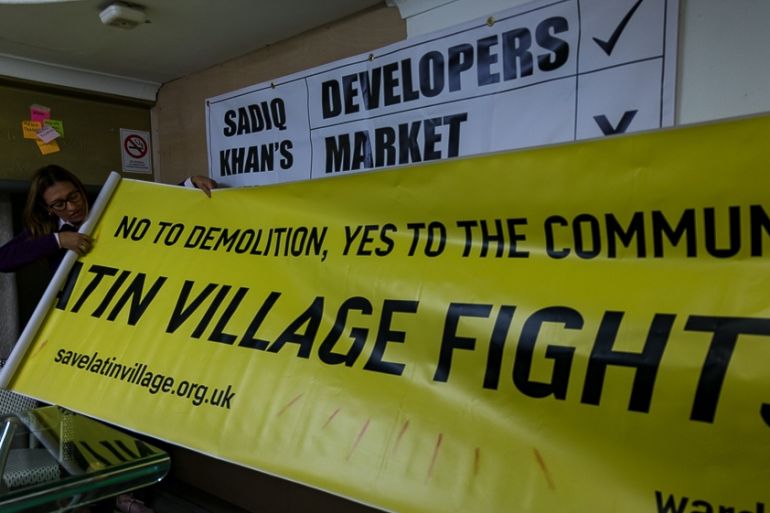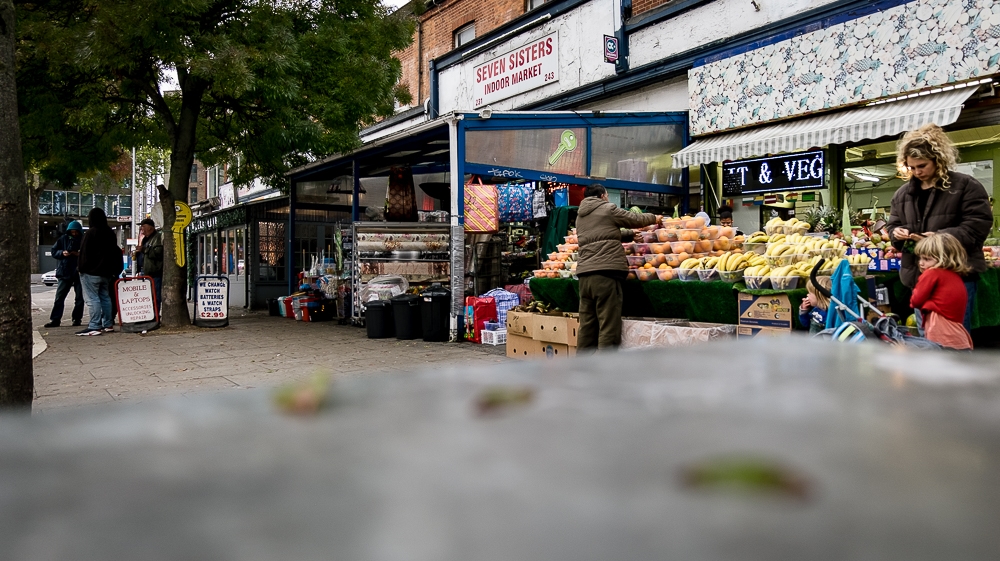Can London’s Latin Village survive ‘redevelopment’ scheme?
Seven Sisters Indoor Market traders from across Latin America feel unmoored as property developer project gathers pace.

London, United Kingdom – Below a Victorian red-brick facade in Tottenham, north London, an inconspicuous sign announces Seven Sisters Indoor Market.
Inside, salsa music crackles from a nearby TV. Bunuelos, empanadas and other Latin delicacies are stacked in pyramids in front of a Colombian cafe. Around the corner, women sit chatting near a salon.
Keep reading
list of 4 itemsEcuador weighs security, international arbitration in latest referendum
‘Triple spending’: Zimbabweans bear cost of changing to new ZiG currency
Boeing hit with 32 whistleblower claims, as dead worker’s case reviewed
The market has been a hub for working-class, migrant communities in London for decades.
These days, it is known as the Latin Village – an epicentre for the Latin American community with scores of independent traders, drawing visitors from across London and the UK.
Since 2004, the market has been at the heart of plans to redevelop the area.
Property developer Grainger plc, in partnership with Haringey Council, will build over 40,000 sq ft of retail space, as well as 196 residential units – none of which will be affordable housing.
UN human rights experts have condemned the scheme, arguing that it represents a “threat to cultural life”.
While Grainger is promising traders space in a temporary market in Apex House across the road, they will have to wait years before being shifted back to the new market on the redeveloped Wards Corner site.

Vicky Alvarez left Colombia in 1989 as a political refugee after her father was killed. When she arrived in the UK, there were few Colombians. Back then, a BT calling card cost £5 ($6.41) and lasted just two minutes.
“It was difficult because you don’t know when you can go home, or if you can return home,” she said.
She has been a market trader for 18 years, and has a beauty salon and money transfer service.
Since 2004, Alvarez has been at the helm of a campaign to protect the Latin Village.
She claimed that traders who have shared concerns about the regeneration scheme have faced obstacles from market management. Her rent, she said, was recently raised with just one week’s notice by 27.8 percent, the highest of any market trader.
The market offers more than just livelihoods. It has become a place where the community feels at home and can connect with their cultures.
“It’s not an exclusive market, it’s inclusive,” says Alvarez’s partner Patrick Rey, who works at the money exchange.
“They call it Latino because there is a greater number of Latinos. But we’ve got people from all over the place, and we want to attract more people.”
Ben Nyerende is one non-Latino trader. Originally from Uganda, he set up his estate agency in 2006.
“We help each other, that’s the way it is. We’re like family here,” he told Al Jazeera, sitting at his desk.
Since the redevelopment plans surfaced, he has felt uncertain about the future.
“If we all move, it’s only two percent that is going to survive there,” he says. “The rest are going to vanish.”
Daniel Martinez, a Colombian butcher at Latin Village, said: “From day one we have not been part of the picture, they have used us only to achieve their own goals, not the interests of the traders.”
Seven Sisters Market is a core community resource for Latin Americans. I think the fact that they've been fighting this long is a testament to the importance of the community for the Latin American population in the whole of London - not just in Haringey.
While traders have been offered an initial rent-free period for three months, followed by fixed rents for “up to five years”, Grainger is unable to disclose how much the rent might be.
“Some will pay more and some will pay less, but it will ultimately depend on the unit traders choose to occupy,” said a spokeswoman for Grainger.
“While it’s understandable to have concerns of the redevelopment of the market, this project is also about securing the long-term future of the market traders.”
For his part, council leader Joseph Ejiofor stressed that Haringey Council is committed to a sustainable Latin Village market.
Despite these reassurances, traders still fear they will not be able to afford their stalls in the long term.
Regeneration is not unique to Seven Sisters.
Elephant and Castle, an area in South London with the highest concentration of Latino businesses, is undergoing an expensive “update”.
About 85 percent of Latin Americans engage with their culture at Elephant and Castle and Seven Sisters, according to a report co-authored by Cathy McIlwaine, geography professor at King’s College London.
“Seven Sisters Market is a core community resource for Latin Americans,” McIlwaine told Al Jazeera. “I think the fact that they’ve been fighting this long is a testament to the importance of the community for the Latin American population in the whole of London – not just in Haringey.”
Latin Americans are the second-fastest growing non-EU migrant population in London, she said, adding most migrate because of economic factors.
As it stands, the Seven Sisters Market building is in urgent need of repair, and there are also some traders who support Grainger’s plan.
But Stuart McNamara, a former councillor who lives near the market, worried that the community as a whole was being ignored.
“The idea that councils have allowed people to build things with zero affordable housing, no community amenity space, no thought about how people fit into it, you’re missing the point. Because if you don’t see regeneration [among] the people that are going to be affected, it’s just a contract for somebody to build something,” he said.
The West Green Road/Seven Sisters Development Trust, a non-profit organisation, has put forward an alternative vision for the redevelopment – the Wards Corner Community Plan, which would restore the market building, offer affordable business space and create a hub that is self-managed by the community.

The day is drawing to a close in Seven Sisters and Alvarez helps unravel a banner for an upcoming protest that reads: “No to demolition, Yes to the community.”
She will be demonstrating against the Compulsory Purchase Order, which was approved by the Royal Courts of Justice, and authorises the market’s demolition.
While Grainger and Haringey Council insist this is not a demolition of the market – “re-provision” is their preferred term, many traders feel the scheme is deliberately designed to push them out.
“It’s a filtering system so by the time you move to the temporary market, then go over to the new market, we ain’t gonna be there. That’s called social cleansing,” said Rey.
“You’re not just fighting to save the market, you’re fighting to stop the mentality that … the developers, the councils have, that they think they can just do whatever they like with you. This market represents the fight against that mentality. If you let that mentality win, everybody will lose. If not here, somewhere else.”